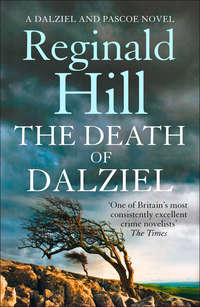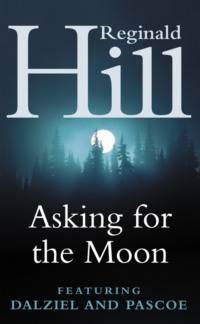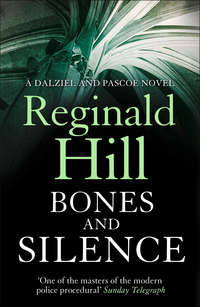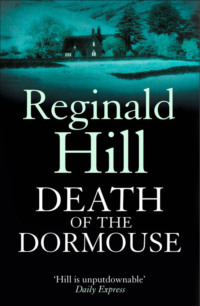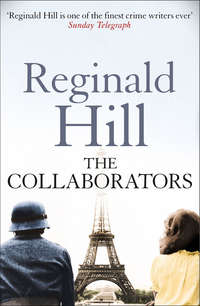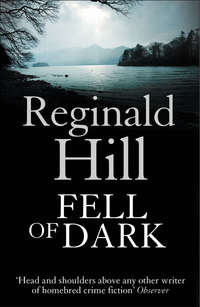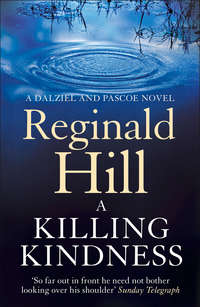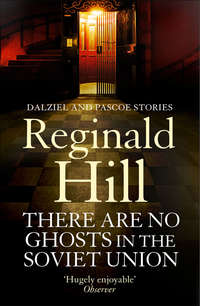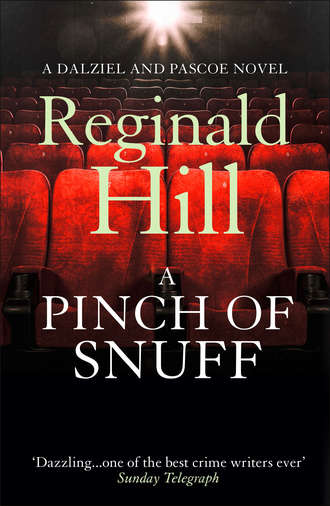
Полная версия
A Pinch of Snuff
At the hospital they learned that Haggard, though intermittently conscious, was not in a fit state to be questioned so they had bacon sandwiches and coffee in the police canteen before returning to the Club.
Arany was still there.
‘Anything missing yet?’ asked Pascoe.
‘Not that I have found,’ said Arany. ‘Some drink from the bar, perhaps. It is hard to say, so much is broken.’
‘Well, keep at it. Perhaps you could call down at the station later, put it down on paper.’
‘What?’ enquired Arany. ‘There is nothing to put.’
‘Oh, you never can tell,’ said Pascoe airily. ‘First impressions when you arrived, that kind of thing. And by the way, would you bring a complete up-to-date list of members with you? Come on, Sergeant. Let’s see if the Misses Andover are up and about yet.’
The Misses Andover were, or at least their curtains were now drawn open. Pascoe pulled at the old bell-toggle and the distant clang was followed by an equally distant opening and shutting of doors and the slow approach of hard shoes on bare boards. It was like a Goon-show sound track, he thought. Eventually the door opened and a venerably white-haired head slowly emerged. Timid, bird-like eyes scanned them.
‘Miss Andover?’ said Pascoe.
The head slowly retreated.
‘Annabelle!’ cried a surprisingly strong voice. ‘There are callers enquiring if you are at home.’
‘Tradesmen?’ responded a distant voice.
‘I thought you said they were deaf,’ murmured Pascoe.
‘They are. They switch their aids off at night,’ answered Wield.
The head re-emerged, accompanied by a hand which fitted a pair of pince-nez to the little nose, and proceeded to scan the two policemen. When it came to Wield’s turn, the head jerked in what might have been recognition or shock and withdrew once more.
‘Mr Wield is one of them, Annabelle.’
‘Then admit them, admit them, you fool.’
The door swung full open and they stepped into the past.
Nothing in here had changed for two generations, thought Pascoe looking round the dark panelled hall. Except the woman who stood before him, smiling. She must have been young and pretty and full of hope when the men delivered that elephant’s foot umbrella stand. Now the folds of skin on her neck were almost as grey and wrinkled as those on the huge foot which had been raised for the last time on some Indian plain and set down (no doubt to the ghostly beast’s great amazement) here in darkest Yorkshire.
‘Miss Andover will be down presently,’ announced the woman, her eyes darting nervously from one to the other.
‘Thank you, Miss Alice,’ said Wield.
‘Miss Alice Andover?’ said Pascoe.
Wield smiled.
‘Then you too are Miss Andover,’ Pascoe stated brightly.
‘Oh no,’ said the woman, shocked. ‘I am Miss Alice Andover. This is Miss Andover.’
She indicated the figure of (Pascoe presumed) her elder sister descending the gloomy staircase.
The sisters were dressed alike in long flowered skirts which might have been antiques or the latest thing off C & A’s racks. From the starched fronts of their plain white blouses depended the receivers of two rather old-fashioned hearing aids. Annabelle, however, was several inches the taller and wore her even whiter hair in a simple page-boy cut while her sister had hers pulled back into a severe bun. Her face had probably never been as pretty as her sister’s, but she had an alert intelligent expression missing from the younger woman’s.
‘My dear,’ said Alice, ‘this is Mr Wield, as you know, but I’m afraid the other gentleman has not been presented.’
‘My fault entirely,’ said Pascoe, entering into the spirit of the thing. ‘Perhaps I may be allowed to break with convention and present myself?’
‘Whoever you are,’ said Miss Annabelle, ‘there’s no need to treat us both like half-wits even if m’sister asks for it. Alice, stop being a stupid cow, will you, dear? She saw Greer Garson in Pride and Prejudice on the box the other week and she’s not been the same since. Let’s go in here.’
She led the way into a bright Habitat-furnished sitting-room with the largest colour television set Pascoe had ever seen lowering from one corner.
‘Well?’ said Miss Andover impatiently, taking up a stance in front of the fireplace and lighting a Park Drive. ‘As you’re with the sergeant, I presume you’re a cop, and from the way he’s hanging back behind you, you must have some rank. Unless you’re a princess and he’s just married you.’
The quip amused her so much that she laughed till she coughed.
Pascoe waited till she’d finished both activities and introduced himself in a brusque twentieth-century fashion.
‘The house next door, Dr Haggard’s house, was broken into last night and a deal of damage done. I wondered if either of you heard anything?’
Miss Alice gasped in fright and seemed to shrink into herself but her sister just whistled in surprise, then shook her head, pointing to her hearing aid.
‘An advantage of this thing is that I need hear only what I want to. It’s very useful at night and when I’m with extremely boring people.’
‘So you heard nothing?’ persisted Pascoe.
‘I’ve said so.’
‘Miss Alice?’
‘Oh no. I switched off too,’ said Alice, evidently retrieved to the present moment by her sister’s command.
‘Which side of the house do you sleep?’ asked Pascoe, causing a time-slip in Miss Alice who put her hand to her mouth in horror at his indelicacy.
‘First floor on the Wilkinson House side,’ said Miss Annabelle. ‘Alice is at the back, I’m at the front.’
‘It’s a very large house,’ said Pascoe. ‘May I have a look upstairs just to get an impression of where you’d be in relation to next door?’
‘By all means,’ said Miss Annabelle. ‘Follow me.’
They set off in procession up the gloomy stairs, the older woman leading, the two men close behind and the younger sister trailing.
On the first floor they halted and Miss Annabelle flung open doors.
‘These are our bedrooms. Mine here and that’s Alice’s. As you can see, they abut on to Wilkinson House, but we weren’t disturbed. Over there are another couple of rooms, used to be our parents’ bedroom and dressing-room. We don’t use them now. Bathroom, boxroom. We use this as a sewing-room or rather Alice does. Me, I was never a hand with the needle. But Alice is an expert. Makes all our clothes in here. Gets the best light, you see.’
Pascoe peered in. The room was full of material, some of it draped around a dressmaker’s dummy. On a smooth polished table stood an ancient foot-operated sewing machine and a work basket with all the tools of the art, needles, cotton reels, buttons, pinking shears, edging tape, everything.
‘A hive of industry,’ he said brightly. ‘It’s a big house. You live here alone?’
‘Not quite,’ said Miss Annabelle and flinging back her head she cried, ‘Una! Duessa! Medina! Acrasia! Archimago! Satyrane! Guyon! Britomart!’
A moment later the room was filled with cats. They were all Siamese, of various ages and pointings, but all possessing in common an extremely loud voice.
‘Apart from these, we live alone,’ said Miss Annabelle. ‘Do you want to go higher?’
‘If I may.’
They set off again.
‘Careful,’ said Miss Annabelle. ‘The carpet’s a bit tatty here. Well, here we are. Nothing much to see. These were servants’ rooms. Empty now. The age of the servant is past, I fear.’
‘And this one?’
‘Ah, yes. That’s our old nursery.’
She pushed open the door. Spring sunlight fell through a dusty casement window into the long, quiet room, bringing life and colour once more to the shabby old-fashioned wallpaper with a design of rather menacing fairies. Everything was still there. A rocking-horse, white and scarlet piebald. An antique play-pen. A four-feet-high doll’s house with detachable front, which Pascoe was certain would be worth a small fortune in an antique shop. A stack of picture books. A gaggle of dolls.
‘Makes you wonder what on earth happened, doesn’t it?’ said Miss Annabelle.
Pascoe glanced round. Miss Alice was hanging back, not even looking through the door. He felt a pang of desperate pity for her. The past must call her like a drug, but she was trying to turn away from it, probably because there were strangers present.
‘Well, thank you very much,’ he said, walking from the room into the corridor once again. ‘Now, let me get my bearings. Wilkinson House is there, right? Now, let me see.’
There was a narrow corridor between the two servants’ bedrooms. At the end was a door. He approached it and turned the handle, but it was locked.
‘Now I bet that goes into Mr Haggard’s kitchen,’ he said half to himself. ‘How interesting.’
‘Right you are,’ said Miss Annabelle. ‘It’s been there years. It was very useful when I helped out in the school. How’s Dr Haggard taking it, by the way?’
Pascoe looked at Wield realizing he had not mentioned Haggard’s injuries. Wield’s face was impassive.
‘I’m sorry,’ said Pascoe. ‘I should have said. Dr Haggard was attacked. He’s in hospital.’
Miss Alice screamed and even Miss Annabelle looked shaken.
‘We’ll be seeing him at the hospital soon. We’ll take him your best wishes, ladies,’ said Wield, suddenly genial like a beacon on Skiddaw.
‘Please do,’ said Miss Annabelle while her sister, clinging to her for comfort, nodded accord.
‘We will, we will,’ said Pascoe. ‘I’m sure he’ll feel all the better for knowing that you were not disturbed by the unpleasantness.’
Which unlikely hypothesis was never to be put to the test.
For when they reached the Infirmary they discovered that Haggard was dead.
Chapter 6
‘Dead?’ said Dalziel. ‘Oh shit!’
Pascoe waited patiently to see if this was an expression of grief or something else.
‘Last thing I need’s a murder enquiry,’ continued the fat man. ‘Bloody doctors. Couldn’t they have injected him or connected him to something?’
‘He’d been very badly beaten. His face was a mess. Nose broken, teeth loosened. Several ribs smashed. Evidently it was internal haemorrhaging that killed him, probably caused by a kick in the gut. They thought they’d got it under control, but his heart packed in.’
‘Heart, eh?’
For a moment Dalziel looked uneasy.
‘Yes,’ said Pascoe. ‘And there was one other injury. Or perhaps I should say six. He’d been caned. Very hard. On the backside. They counted the weals.’
‘Six of the best!’ said Dalziel. ‘Well, well.’
‘They made the jokes too,’ said Pascoe. ‘The doctor told me that there was no way of timetabling the various injuries outside of saying they all occurred at least an hour before he was admitted and not earlier than six hours before that.’
‘That’s about as helpful as most of what they tell us,’ sneered Dalziel.
‘I think he was suggesting that the caning and the beating-up may not have been done at the same time or for the same reason.’
‘Haggard’s got a kink, you mean? Christ, I don’t need any wog medicine man to tell me that – he was one of your erudite Asians, I suppose? They usually are after midnight.’
‘You mean, something’s known about Haggard?’
Dalziel grinned like an advert for Jaws.
‘In this town something’s known about every bugger,’ he said. ‘If I could get half the sods I drink with in the Rugby Club bar into CID, the crime rate’d be halved tomorrow. Or into gaol for that matter.’
‘I know I’m a soccer man,’ said Pascoe, ‘but if you could see your way …’
Dalziel settled back in his chair and scratched his right groin sensuously.
‘I’d have thought you and Wield, being so interested in the Calli, would have known all there was to know about Gilbert,’ he said in ponderous satire. ‘He was an interesting fellow. Like you, Peter.’
‘Like me?’ said Pascoe, alarmed.
‘Educated, I mean. University. A real university, though. Oxford. And a real subject. Classics.’
Having seen his own university and discipline dismissed as illusory, or at best mimic, Pascoe felt a need to re-establish himself.
‘Was he a real doctor too? I mean, he wasn’t brown or yellow or black, which puts him halfway there already, doesn’t it?’
‘A Doctor of Philosophy, oh yes,’ said Dalziel, delighted at having provoked a response. ‘You ever thought of trying it?’
‘Taking a research degree?’ said Pascoe in surprise.
‘No. I meant philosophy,’ said Dalziel. ‘It helps you keep your temper, they tell me. Well, he did a spell in the Foreign Office. He was out in Africa or West India, somewhere hot and black. Then he went to Europe, Vienna, I think. My more intellectual contacts …’
‘Old scrum-halves,’ interrupted Pascoe.
‘You’re learning. They tell me getting from the mosquitoes into Europe would be a step up. Things going well. Then, about 1956, he left.’
‘Why?’ asked Pascoe.
‘How should I know why?’
‘I thought the Rugger CIA knew everything.’
‘A man abroad’s like a team on tour,’ said Dalziel. ‘What you do there doesn’t count. Any road, when he got back to England he started teaching, down in Dorset or some such place.’
‘What kind of school?’
‘One of them what-they-calls-it, prep schools.’
‘A bit of a come-down after the governor’s palace,’ said Pascoe.
‘Well, not all that much,’ said Dalziel. ‘He started as headmaster.’
‘Good God! With no experience? I knew these places were low level, but surely …’
‘Ah yes,’ said Dalziel. ‘But he’d bought it. I mean, it was his. He’s not going to sit around being third-Latin-teacher-in-charge-of-tuck-boxes, is he? Not when it all belongs to him.’
‘He had money then?’
‘Not when he went to foreign parts, they say. But when he came back, he had enough. After three years he sold the school and moved on. He bought another place near Cambridge. Two years there, then on to Derbyshire. Next stop – here. You’ll have noticed a progression?’
‘North,’ said Pascoe.
‘Good,’ said Dalziel. ‘I’ll be able to send you out to post letters before you’re much older.’
‘It looks like he was moving on all the time,’ said Pascoe, ‘when it would make more sense to stay in one place and consolidate a school’s reputation. So presumably there was a reason.’
‘I know nowt about reasons,’ said Dalziel, reaching the end of his scratch. ‘Only …’
‘Yes?’ prompted Pascoe.
‘Some slanderous sod once told me, and I wouldn’t normally listen but we were drinking and it was his next shout, that it was just a simple organizational error that caused the trouble. Kind of thing that could happen to any man.’
‘Yes?’ repeated Pascoe. He could see that Dalziel was enjoying himself. It was like being in a cage with a frolicsome brown bear.
‘Oh yes. Every now and then it seems that Haggard, when he had to punish some lad, would get him in his study and say, “I’m sorry, boy, this means six of the best, you realize that? Go and fetch the cane.” And the boy would go to the cupboard and pick a cane and bring it back. Then, and here’s where this error crept in, then Haggard would bend down and the boy would lay into him!’
Dalziel rocked with laughter as he spoke while Pascoe looked on with fascinated horror. After a while the fat man became aware his Inspector wasn’t laughing.
‘What’s up with you then?’ he said, modulating his long bellowing into intermittent chortles. ‘You’re looking like you’ve messed your pants.’
‘I didn’t think it was very funny, that’s all,’ said Pascoe.
‘Not funny. Boy canes headmaster? It’s like man bites dog!’
‘Yes. I can see that. Only, the whole situation, well, it’s pretty nasty, isn’t it?’
‘Nasty?’ said Dalziel, amazed. ‘I thought you were one of these free-wheeling whatever-turns-you-on types? You’re noted for soft-pedalling on these squatters and six-in-a-bed communes. What’s bothering you here?’
‘Well, it’s the children. The effect something like that must have on a child …’
‘Come off it!’ exclaimed Dalziel, ‘Caning teacher? It’s every kid’s dream. Mind you, I wouldn’t like any lad of mine in a school like that. Oh no. And once word got out, the schools folded pretty quickly and Haggard moved on even quicker. But as for harming the boys! – as long as he didn’t touch ’em (which he didn’t) how could he harm them? That’s like saying …’
He paused to search out an analogy.
‘Like saying, that using a truncheon on policemen could be bad for criminals?’ suggested Pascoe.
‘Go and get stuffed,’ said Dalziel, very much put out at the failure of his humorous anecdote.
‘And was there anything like this while Haggard was running his school here?’ asked Pascoe.
‘On my patch? You’ve got to be joking!’ said Dalziel indignantly. ‘He sometimes whacked the poor little sods a bit too hard, but hardly anyone complained.’
‘Except, presumably, the poor little sods.’
‘It wasn’t their money,’ said Dalziel. ‘Anyway, there’s two theories for you.’
‘Two?’
‘Either Gilbert Haggard had been getting up to his old tricks with some co-operative friend who took things too far. Or some poor little sod came back for a bit of eye-for-an-eye. OK?’
‘Thank you very much,’ said Pascoe fulsomely.
‘Well, we’d better get this show on the road,’ said Dalziel. ‘A man like that, you’d think he’d have his heart checked regularly, wouldn’t you?’
‘It can happen to the best of us,’ said Pascoe.
‘That’s all right then. Well, don’t hang around here. Go and do something. You’d best find out who was there last night, who left last, that sort of thing.’
Dalziel was never afraid of telling his underlings to do the obvious.
‘Arany’s coming in to make a statement,’ said Pascoe. ‘He’ll know.’
‘Good. I’ll get Sergeant Wield to organize a house-to-house round the Square. He knows who’s who after listening to all their complaints. And we’d best pick up a few likely tearaways and bounce them off the wall a bit. That’s favourite, I think: yobbos looking for mucky pictures and loose change, Haggard disturbs them; bang!’
‘Oh dear,’ said Pascoe. ‘What about those two super theories you gave me?’
‘You shove off and get some work done,’ said Dalziel grimly.
‘I’m going, I’m going.’
‘And Peter …’
‘Yes?’ said Pascoe at the door.
‘Next time you tell me my stories aren’t funny, you call me sir.’
‘Yes, sir,’ said Pascoe.
Wield had returned to the Square to set his team of detective-constables on their round of house-to-house enquiries. He himself at Pascoe’s request came back to the station bringing Arany with him.
The Hungarian seemed indifferent to the news of Haggard’s death. Pascoe remarked on this.
‘We were business associates, not friends,’ said Arany. ‘It is a distressing thing, but not a remarkable one. Old men die. Death comes out of a clear sky. I hope you find who did it, though when you do, what will happen to him? A little rest, then freedom again. In this country, there are no punishments.’
‘I’m sorry you’ve found us so deficient,’ said Pascoe. ‘I won’t keep you too long. It’s just a question of a statement.’
‘I have made my statement.’
‘Oh?’ Pascoe looked up at Wield who regarded him impassively.
‘To the sergeant. I told him what I know, which is nothing; what I saw, which was nothing; what is missing, which so far as I can assess is nothing.’
Arany emphasized his speech by moving his head from side to side like a fox in a cage.
‘Well, we’d best get it down on paper. Sergeant.’
‘Sir?’
‘Why don’t you fetch Mr Arany’s file.’
‘Yes, sir,’ said Wield. ‘I’ll see if the Superintendent’s finished with it.’
He turned on his heel in a very military fashion and left. Pascoe observed Arany carefully to see his reaction to all this gobbledegook. It seemed to him that for a moment the man looked uneasy, then his features resumed their watchful blankness. There was something rather un-English about it, thought Pascoe. Even the native criminal classes were not so frightened of anything that they needed to hide behind neutrality. It was a comfortable chauvinist thought.
‘You’re a naturalized citizen, I believe,’ said Pascoe conversationally.
‘Yes.’
‘Ever go back to Hungary? I mean, would it be possible now that things have had twenty years to quieten down?’
‘I would not care to try, Inspector.’
‘You still have relations there?’
‘Everybody has relations,’ said Arany.
‘But no one you keep in touch with?’
‘No one.’
‘How long have you known Mr Haggard?’ said Pascoe, switching direction.
‘Four years. Five. Does it matter?’
‘I’m just interested in your business relationship, Mr Arany.’
‘Does it matter?’ repeated Arany. ‘Is it relevant?’
‘It depends on why he was attacked,’ said Pascoe.
‘Why? Vandals, surely. Teenagers, breaking in for a lark. Mr Haggard would fight with them.’
‘He was that kind of person?’
‘Oh yes. Fearless. Of the old school,’ said Arany.
Was there a note of irony in his voice? wondered Pascoe.
‘Perhaps you’re right,’ he said. ‘Still, we must take a look at your members, I’m afraid.’
‘I have a list. It is up to date,’ said Arany. He produced a brown envelope from his inside pocket and handed it over.
‘Most efficient,’ said Pascoe. ‘Now I wonder if you could also draw up a list of those present at the performance last night, so far as you can recall.’
He pushed a sheet of paper and a Biro across the table to Arany.
The Hungarian thought a moment, then started writing.
Pascoe meanwhile started looking through the membership list.
He recognized many of the names, just as he had recognized faces on his visit two nights earlier. Ellie’s escort, Arthur Halfdane, was there. Trendy radicals could afford to belong to such clubs, but local politicians obviously had to be a bit more careful. Godfrey Blengdale might have enjoyed the show but his name wasn’t on the list. Pascoe wasn’t surprised. He knew the man mainly through the papers and the less than Leica impartiality of Ellie’s appraisal. When the family timber yard had fallen into Blengdale’s care at the age of twenty-six, it had been (like many old-established businesses run on outmoded principles such as value for money and honest dealing) on the verge of bankruptcy. Blengdale had wheeled and dealed and diversified into producing ready-to-assemble whitewood furniture which compensated for its difficulty of assembly by its ease of collapse. But his prices were competitive, his delivery dates held to, and his standards of manufacture (after a minor lawsuit or two) as reasonable as anyone else’s in the field. Blengdale’s had prospered and Godfrey Blengdale had become a figure of some importance, entertaining lavishly at his converted farmhouse a couple of miles from Holm Coultram College, supporting good works generously and finally offering himself to the electrorate with the kind of aplomb and savoir-faire beloved by working-class Tories the world over.
He thinks that God is short for Godfrey, proclaimed Ellie, which, if not original, was certainly apt.
And God might view the cavortings of postlapsarian Adam and Eve with some amusement, but he wouldn’t let his name be carved on a tablet of members of a celestial Ultra-Paradise Club.
Further down the list he came across Jack Shorter’s name. So Shorter’s ‘friend’ had been mythic. A pointless bending of the truth, but understandable.
At least, he could understand it. Dalziel would probably seize upon it as evidence of his worst suspicions.
As Arany finished writing, Wield returned. He handed a bulky cardboard wallet to Pascoe, saying, ‘Sorry to be so long, sir. I had to go to Central Records.’
‘Thank you, Sergeant.’


